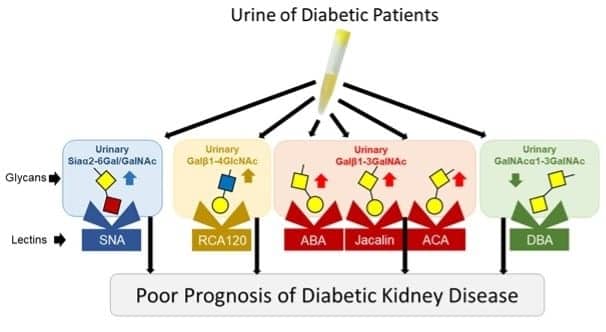One of the complications of diabetes is diabetic kidney disease (DKD), a condition in which the kidneys do not filter blood correctly and eventually fail. DKD is one of the most common causes of kidney failure and affects approximately 40% of patients with diabetes.
Diagnosing DKD normally requires checking for proteins such as albumin that leak from the blood into the urine as a consequence of the malfunctioning filtering; these proteins are used as biomarkers to monitor the progression of DKD and predict the renal prognosis at the early stages of disease. However, new biomarkers that could help identify the onset of DKD earlier and predict the renal prognosis more accurately would be very beneficial for patients with a rapid deterioration of renal function.
One emerging possibility for research is the role of glycosylation in diabetes and the progression of DKD. Because of their complicated structure, glycans are difficult to quantify in urine samples, and few studies exist about the role of glycosylation in DKD. However, a method previously introduced by Jun Wada, MD, PhD, and Koki Mise, MD, and colleagues at the University of Okayama in Japan enables high-throughput quantification of the binding of glycans to 45 different proteins, opening up investigation of the association between the urine glycosylation profile and renal prognosis in patients with diabetes.
A recent study involved monitoring 688 patients with type 2 diabetes plus 134 control patients with neither diabetes nor DKD, over a period of 4 years. The results suggest that levels of glycans are significantly associated with the evolution of renal function, and that changes in the glycosylation of a particular protein occur in the early stages of DKD before other detectable signs of deterioration of renal function develop.
Because the indexes for glycans are associated with the renal prognosis independently of other commonly used indicators, adding the combined glycan index to other indicators of the progression of disease can significantly improve the prediction of the renal outcome. The results of the study also provide insight into how glycosylation changes in DKD.
To follow this and other research at the University of Okayama, visit the university’s research highlights.
Reference
1. Mise K, Imamura M, Yamaguchi S, et al. Identification of novel urinary biomarkers for predicting renal prognosis in patients with type 2 diabetes by glycan profiling in a multicenter prospective cohort study: U-CARE Study 1. Diabetes Care. 2018;41(8):1765–1775; doi: 10.2337/dc18-0030.





